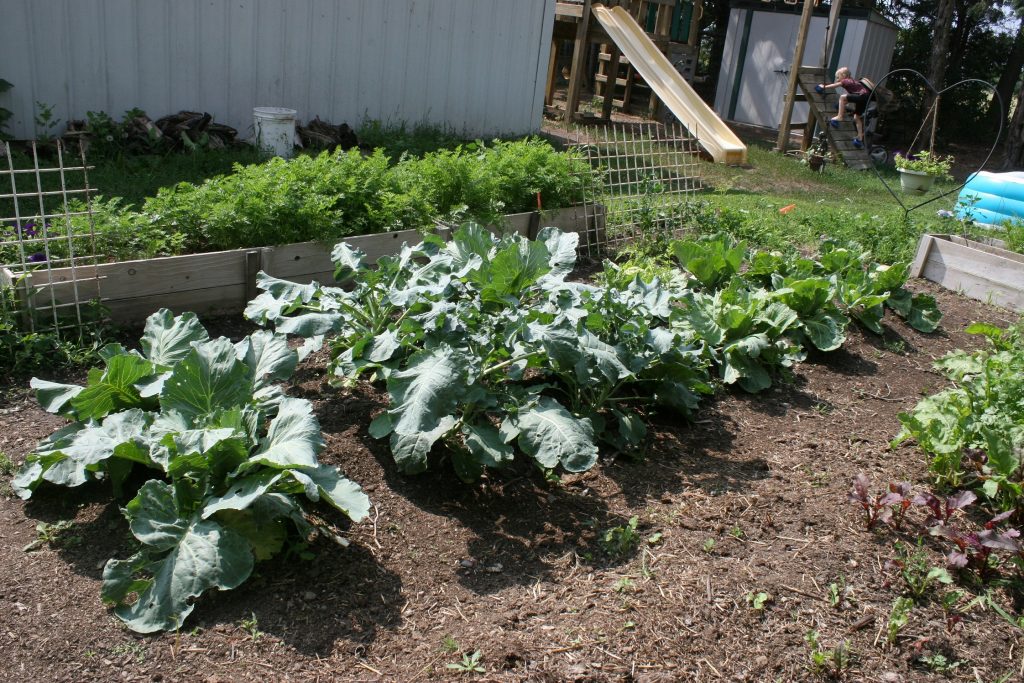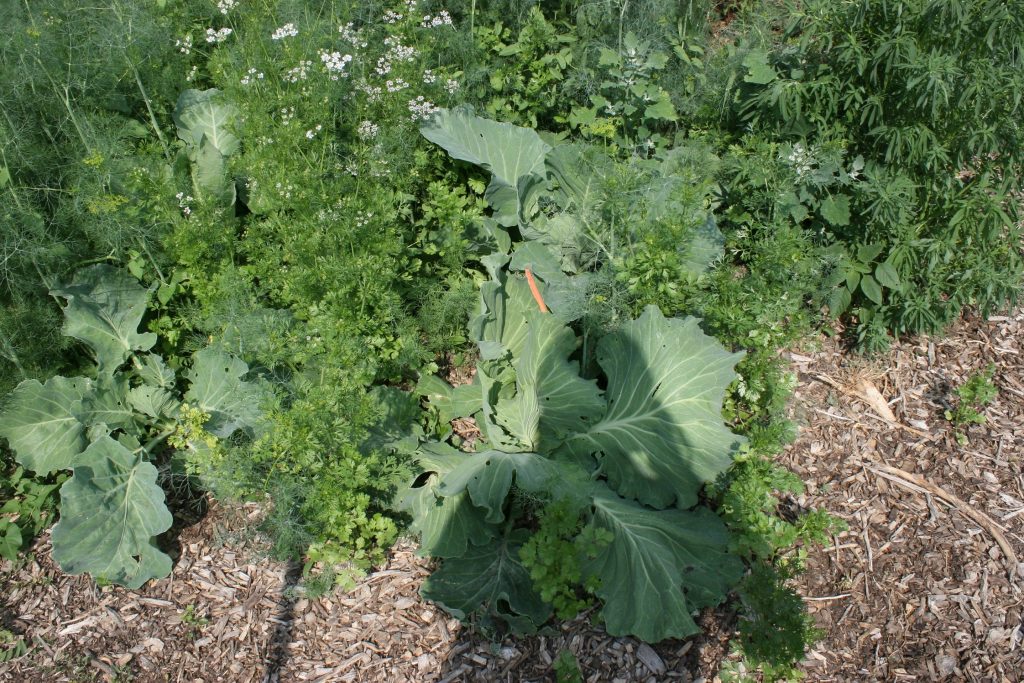

I was asked several weeks ago to give an update on our garden from the last growing season, so I thought I would share that with you today. We experienced an exceptional drought in our area last year, so this was a really good test of our methods. I was really happy with the abundance we had, but realized quickly that we still have work to do.
We are doing several methods for growing food on our farm and will continue to experiment. We use the Back to Eden method for growing our tomatoes, peppers, raspberries, lettuce, herbs, mushrooms, and kiwi. I especially like this wood chip/compost method for perennials. Our soil in that area is incredibly rich and holds moisture well thanks to the years of adding compost/wood chips. My husband tested the paths of this garden to see if there was any compaction, and he was easily able to stick a post about two feet deep (during this terrible drought). I would say compaction is definitely not an issue there.
The one problem that I have had with this method in recent years was with bind weed. This weed loves my wood chip garden and spreads quickly. I have had many people tell me that you can’t control it, so I was feeling really overwhelmed this summer, as it was spreading to new areas despite our constant weeding. In praying for wisdom about this, I decided to try a shovel to get down really deep around each plant. In the past we were just pulling it up with our hands. I noticed that after doing this, I didn’t have as many plants return right away. Recently I heard another grower say that he did the same thing, and he was able to get control of it. That was very encouraging.
Last year we put rows of wood chips down our tree lines of our orchard and surrounded a large area around the trees with these chips. We have about 35 trees and hope to keep growing this area. We are using some of the principles from Permaculture Orchard, and we plan to incorporate more this year by putting plants in between the trees (bee food and people food). I do believe the wood chips helped with not having to water as much, but I didn’t see much difference in the health of the fruit trees. The quality of the fruit was not as good this year, but it could have been the drought too. The apple tree in our wood chip garden that has been surrounded by wood chips for many years was loaded with beautiful, flavorful, undamaged apples at the same time. Ever since we added the wood chips around this apple tree, the flavor and quality continue to improve every year. I’m hoping the same will be true with our orchard.
Last growing season, I was out in my orchard feeling very discouraged. My plum trees had orange bugs with black spots attacking them. The leaves were damaged and the undersides of every leaf was covered in eggs. I started scraping away eggs with my fingers, as I was thinking and praying about what to do. I remembered that I had made up my mind never to use an insecticide, even if it was as natural as Diatomaceous Earth. I decided very quickly that plums just weren’t going to do well here. I would think of something else to plant instead. The next day when I looked at the trees though, I noticed that it was covered in lady bugs! They were eating the eggs and taking care of the infestation! I couldn’t believe my eyes. I grabbed all the little ones and gave them a quick science lesson, and then we praised God for his amazing creation.
I shared a post about how we grew our potatoes here. I do not like this method because of the heavy tillage and amount of work, but I do like the abundance of potatoes we were able to grow with this method. This year I’m planning to try a new method (we are moving away from tilling) that I found online. You can check out the video here. I have used a similar method in growing beets, cabbage, and onions. I have loved the results that I have been getting the last two years from this system and plan to do even more beds. I learned about this from Richard Perkins here.
For fertility we use fish emulsion and our own worm castings and compost. I never use any organic formulas that you can find at the store, because I don’t trust that they are good for soil health. I have had excellent results with all of my plants and trees using these three additions. These methods have been scientifically proven to promote beneficial insects, repel pests, and produce very nutrient dense food. I do believe that our ducks and guineas help with decreasing the potato beetles, Japanese beetles, cabbage worms, and cucumber beetles. Unfortunately, I learned too late last year that our ducks love lettuce and devoured my entire crop in a day. I will have to keep them away from that!
I’m always learning things the hard way and here are a few things I learned from this year. Consistent watering is critical for abundant harvests of some plants. I was not getting very many tomatoes and remembered my mom’s abundance when she watered every day. I started doing that, and we could barely keep up with the processing. When I got lazy and didn’t water a few days out of the week the production rapidly decreased. The next week I got more consistent and watched them explode again.
I have also struggled to get enough cucumbers each year. I believe where I was planting them, the soil where they were, and the large number of cucumber beetles that invade almost immediately have caused my problems in the past. This year I decided to try watering them twice per day to keep their stress very low, and I planted them in deeper compost. This could have been coincidence, but this was the first year I had more cucumbers than I could use.
Another experiment I tried was letting the cilantro and dill grow close to my cabbages. Some years I have insect damage, but this year I didn’t. It may have just been a good year, or my focus on soil health could have helped as well, because I noticed that my cabbage that wasn’t surrounded by the plants did just as good. I did notice that letting my garden go a little wild (which does drive me a little crazy) attracted a large number of beneficial insects. The garden was humming with life.
In writing this I do want to say that I have had a lot of failures and losses along the way as I have figured this out. It takes an incredible amount of work and consistency to grow food this way, and that is why it’s very hard to find beyond organic produce. Our family is reading an economics book right now, and in this book the author said that, “farming isn’t anything spectacular.” I have to disagree. A few things I need to work on this year are successive planting, getting a more efficient watering system, and preserving food more quickly. I have learned over the years that observation and consistency are critical to growing food that is nutritious and delicious, and that we have to have patience, because one can’t achieve excellent soil health overnight
